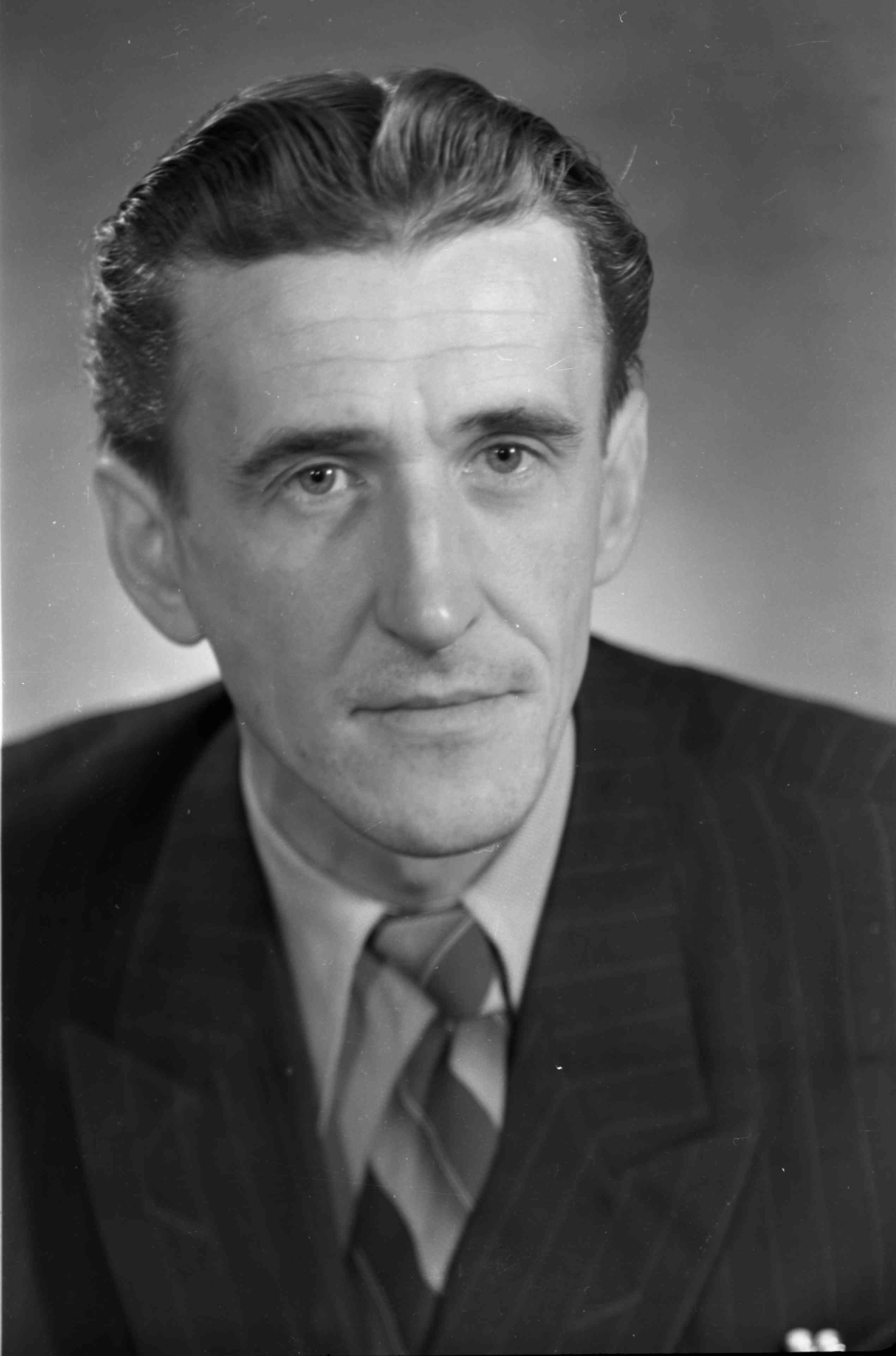
Robert Vaidlo
Robert Vaidlo (until 1935, his last name was Veide; 14. II 1921 – 1. X 2004) was an Estonian writer and publicist, who mainly wrote children’s and young adult thrillers and adventure stories both in the realist and fantastical genres. He also wrote humorous topical satire for adults.
Vaidlo was born in Tartu to a family of intellectuals. He went to school in the Tallinn French Lyceum from 1929-1940. From 1940-1941, he studied at the University of Tartu for a couple semesters, then was drafted to the Soviet army, where he was an artilleryman in the Estonian Rifle Corps. After the war, he worked for the newspaper Rahva Hääl, in addition to contributing to the newspaper Kodumaa. From 1952-1954, he worked as a propagandaist for several agricultural boards. From 1954-1962, he was the head of the culture department of Rahva Hääl. From 1962-1965, he was the head of the department of essays and articles of Looming magazine. From 1965, he worked at Estonian Television, first as editor-in-chief, then as an editor of children and teen shows. After that, he contributed as a journalist to the newspapers Rahva Hääl and Kodumaa. In 1956, he joined the Estonian Writers’ Union and from 1969-1990, he was a member of the Communist Party of the Soviet Union.
Vaidlo has written literary reportage, topical satire and short stories, he focused on children’s literature later. His first story Kadunud havi (‘The Lost Pike’, 1954) meets the demands of the era by describing how an arrogant city boy is transformed by hardworking country boys, i.e. pioneers. In the following story Kotkamäel karjub kajakas (‘Seagull Screams at Kotkamäe’, 1955), the pioneers from the previous story continue their exciting tasks at summer work camp. The children’s book Sõpruse nimel (‘In the Name of Friendship’, 1957) has nine stories and does not follow the didactic Soviet style, but describes various friendships in a humorous manner. The novel Suurtükiväelane Peeter Poligon pajatab (‘Artilleryman Peeter Poligon Tells Stories’, 1958) stands out with its humane, understanding attitude. In it, a war hero tells a group of boys funny yet educational stories of World War II. The children’s book Viirulise purje all (‘Under the Striped Sail’, 1964) depicts the adventurous games of a group of boys living in a small town near a big lake. The topical satire-like Pipraveski (‘Pepper Mill’, 1965), however, is a collection of humor and satire for adults. The children’s book Jutujulla (‘The Story Gizmo’, 1967) offers truthful everyday stories of mischievous boys during a summer in the country. Stories on village life during the kolkhoz era are told in the young adult story Teed viivad alati kuhugi (‘Roads Always Lead Somewhere’, 1975).
Vaidlo’s most well-known work, a grand adventure fantasy fairytale Lood Kukeleegua linnast (‘Stories from Kukeleegua Town’, 1965) depicts a peculiar hand-drawn parallel world that is born of the games of children and reimagines the Soviet reality in a humorous way. The socio-political allegory is continued in the story Doktor Meerikese ja Ponts-Ontsu imepärane merereis (‘The Wondrous Voyage of Doctor Meerike and Ponts-Ontsu’, 1971), where toys make the voyage to Rõmuuta island in an inflatable boat – the island society is reminiscent of a failed communist utopia. The books Kessu (1978) and Kessu ja Tripp (‘Kessu and Tripp, 1988) are meant for younger school children and depict an ordinary girl whose friend is a clown with really curly nose shoes. The author also wrote a children’s play script based on the Kessu books, which ran as a multi-part TV play on Estonian Television in the early 1980s. Later in his career, Vaidlo wrote a few more story books for small children: Ühe ahvi lugu (‘Story of a Monkey’, 1988), Ampa (1995) and Midli-Madli tilpamised (‘The Tilpanings of Midli-Madli’, 2002).
A. O. (Translated by A. S.)
Books in Estonian
Books for children and young adults
Kadunud havi. Tallinn: Eesti Riiklik Kirjastus, 1954, 56 lk.
Kotkamäel karjub kajakas. Tallinn: Eesti Riiklik Kirjastus, 1955, 71 lk.
Sõpruse nimel. Tallinn: Eesti Riiklik Kirjastus, 1957, 102 lk.
Suurtükiväelane Peeter Poligon pajatab. Tallinn: Eesti Riiklik Kirjastus, 1958, 179 lk. [Järgnevad trükid: Tallinn: Eesti Riiklik Kirjastus, 1963, 180 lk; Tallinn: Eesti Raamat, 1980, 192 lk.]
Viirulise purje all. Tallinn: Eesti Riiklik Kirjastus, 1964, 136 lk.
Lood Kukeleegua linnast. Tallinn: Eesti Raamat, 1965, 130 lk. [Järgnevad trükid: Tallinn: Eesti Raamat, 1983, 55+56 lk; Tallinn: TEA Kirjastus, 2011, 131 lk.]
Jutujulla. Tallinn: Eesti Raamat, 1967, 156 lk.
Doktor Meerikese ja Ponts-Ontsu imepärane merereis. Tallinn: Eesti Raamat, 1971, 129 lk. [Järgnevad trükid: Tallinn: Eesti Raamat, 1983, 48+64 lk; Tallinn: TEA Kirjastus, 2011, 140 lk.]
Teed viivad alati kuhugi. Tallinn: Eesti Raamat, 1975, 143 lk.
Kessu. Tallinn: Eesti Raamat, 1978, 47 lk.
Kessu ja Tripp. Tallinn: Eesti Raamat, 1988, 124 lk. [Järgnevad trükid: Tallinn: Tänapäev, 2002, 163 lk; Tallinn: TEA Kirjastus, 2010, 106 lk.]
Ühe ahvi lugu. Tallinn: Eesti Raamat, 1988, 46 lk.
Ampa. Tallinn: Kupar, 1995, 106 lk.
Midli-Madli tilpamised. Tallinn: Tänapäev, 2002, 52 lk.
Humour
Pipraveski. Tallinn: EKP Keskkomitee Kirjastus, 1965, 64 lk.



